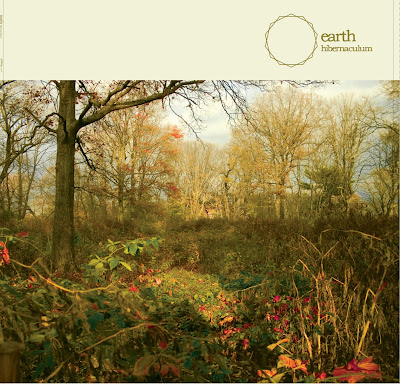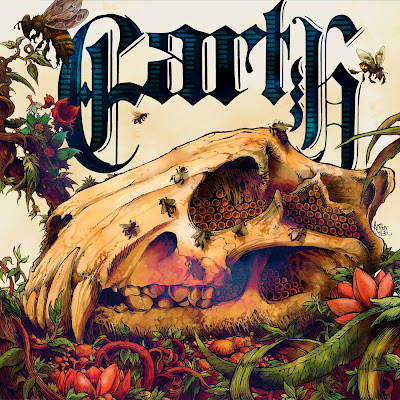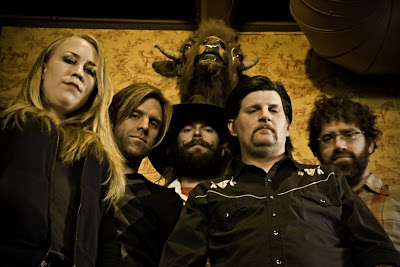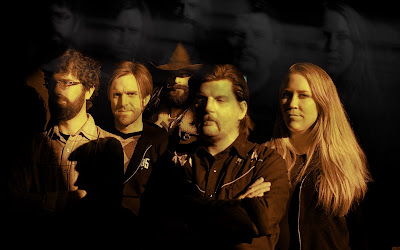>From strenght, sweetness. From darkness, light.
The bees made honey in the lion’s skull.
I was fortunate enough to get a hold of Dylan Carlson, Earth mainman, when the band was visiting Roma, Italy, for their fifteenth gig on the European tour 2008. I did an interview for Sweden Rock Magazine which is featured (in Swedish) in issue #50 (alongside my review of the Treblinka/Obscurity/Uncanny gig, as well as an article about the true Poison, some reviews and more…). Do check it out, as it features a Pest interview, Mars Volta, Hellhammer and the usual dinosaur bands (the fake Poison is on the cover!).
However, the featured interview is only half a page, and I talked to Dylan for 45 minutes, so I thought I’d publish most of what he had to say right here. Enjoy!
I’m too tired to write a decent intro to the article, so if you don’t know anything about Earth shame on you.
Short history lesson:
1990 – Earth – pioneers of the drone genre – is formed by Dylan Carlson.
1996/1997 – 2003 (sort of) – Dylan combats drugs, quits playing guitar and becomes known for being the man who bought the gun with which Kurt Cobain allegedly committed suicide.
2005 – Earth… The return!
2008 – The latest and sixth/seventh album, The Bees Made Honey In The Lion’s Skull, is released and it’s fucking awesome!
—
So where are you right now?
We’re at this venue in Roma, Italy, where we’re doing our fifteenth gig on this tour. We’ll keep on touring until March 9th, I think.
Have you seen the No Country For Old Men movie yet?
No…
But you know the movie?
Yeah, it’s the one based on Cormac McCarthy’s book. He’s one of my favourite authors, actually. He was a big influence on Hex; or Printing In The Infernal Method (2005, Southern Lord), his Blood Meridian or The Evening Redness in the West book.
Hehe, even the titles are similar.
Yeah, haha!
When I watched the movie… You know, it has no soundtrack.
Ah, ok. Hmm… Hehe…
Your new album would fit right in there.
Oh, thanks! Some day, maybe… I would love to do soundtracks, but there hasn’t unfortunately been an opportunity yet.
By the way, what was the reason for recording the Hibernaculum album?
We had been playing some of the older songs on the last tour, and we decided kind of as a thank you to the fans to re-record some old stuff. And we also had the Plague of Angels song which was only available on the tour 12 inch, and we wanted to make that available as well, and then we had the Seldon Hunt documentary, Within The Drone, and we wanted people to see that, so we included that. Also, there’d be a longer period than a year between the albums so we wanted to keep the name out there, keep the momentum going.
So what are the specific differences between old and new Earth?
I think new Earth is more of a band, I’ve been playing with Adrienne (drums) for six years and with Steve (piano, keyboard, trombone) for four-five years, whereas in the past it was always me and some hired musicians. Now there’s a solid line-up, more of a band community. The only member who’s not full time yet is Milky who plays slideguitar, and we haven’t worked him into the permament line-up yet, but hopefully in the future he’ll be with us full time…
The previous albums were much more conceptual, there were sort of a concept and then the music grew out of the concept, as opposed to now where the songs really evolved out of playing together and then the concept for the record came second hand when we’d already done the music. When I sat back and looked at it arranging the songs for the album I could see this pattern here, this forming there and the big idea was formed right there out of the music, afterwards. This time we were kind of jamming and improvising in the studio.
What’s it like with song titles when playing instrumental music?
Normally I have more song titles than songs, but this time I had to sit down and listen to the songs and come up with titles.
But it still sounds conceptual, I think.
Yeah, maybe because we’ve been such a conceptual band in the past, but I definitely saw a concept there after the music was done. I guess either method you arrive at the same spot. It’s always Earth in the end. That’s the goal anyway.
As for song titles, I put a lot of importance in them. I think with instrumental music you’re not telling people what the songs are about so much, you’re hoping that the audience will participate and attach a meaning to them… I try to pick titles that… there’s not a specific thing they’re about, but they sort of sound… there’s another aspect of the music. It sets the mood. I’ve always liked titles that are kind of open ended in meaning. There’s what I think the song is about, the landscapes that I think that the song is creating, and then there’s the audience’s view.
So is there any story behind the album title, The Bees Made Honey In The Lion’s Skull?
It’s related to the Samson and Delilah story. There is a lion terrorizing the land, and Samson kills it, you know.
I guess you’re into minimalism?
I listened to that stuff a lot in the early days, like Steve Reich and La Monte Young… I still like that and consider it an influence, but I always find new stuff to listen to. Not necessarily new bands, but stuff that’s new to me anyway. I’ve always played and listened to minimalistic music, as far as I can remember… I’ve always liked stuff that hits a good riff and a good groove and sticks with it, as opposed to music that’s changing all the time. I’ve always liked that more than stuff that’s real busy. I like it when there’s something underneath holding it all together. The repetition… most of the stuff I like is of a repetitious nature, I guess. Groove oriented, riff oriented… Generally when I listen to music I just listen to music, not doing other things. It’s music time and I put on the headphones. I pay attention.
When you were away from the music scene for all those years, did you know about the upcoming drone scene that was going on… it kind of reinvented itself…
I pretty much quit everything and had to work my way back. I met Greg Anderson when he was still in Goatsnake, and I saw them play, but I wasn’t really aware of music at that time, I didn’t pay any attention. I realized why I was doing it, and the guitar playing was the stuff I really liked, the other stuff didn’t really matter. And if people like what we’re doing, that’s nice, but you can’t really count on that when doing music. My favourite part is just playing and practicing, learning guitar, the rest is just gravy.
Anyway, when I moved back to Seattle and started playing the guitar again I didn’t have any big plan to come back and play Earth again, I just picked up the guitar, and then some opportunities started coming up so I started doing it again to see how it worked out… And then Greg and Southern Lord said they were interested in releasing some new stuff, and that’s when Greg told me the whole Sunn 0))) thing, how they started out, and all those other bands…
Sunn0))) started as a tribute to Earth, right?
Yeah, they’ve been very open about their influences, very generous in their praise and what not… They’ve definitely taken it and moved in their own direction with it. It’s more of a technique than a genre, really. It can be used in all kinds of music, I don’t view it as a genre.
What’s the basics in that technique?
Playing against a pedal tone or an open note, like in indian music, blues, celtic music, african music… it’s all over the world, and now it’s being used in rock music. It was used in rock music in the 60’s by a lot of the psychedelic bands, and old jazz musicians…
Speaking of jazz and such, how did you get in touch with Bill Frisell?
When I started playing guitar again back in 2000 I had read this article by him and I was really into what he was saying, and then he had some music exercises that I was really into as well, and then fortunately enough Steve Moore, our keyboard and trombone player, had played with Bill a number of times and knew him, so he gave him a copy of Hex and invited us to a couple of our shows and he came down and checked us out, so when we asked him he was into it. It worked out.
How did it feel when he added his stuff to the Earth material?
He’s an amazing musician and an amazing person, and he really added to the music. He’s very collaborative… Sometimes those kind of things don’t work out and it turns into a duel or show off or something stupid like that, but he’s not that kind of musician. He just came in and worked with us for a couple of hours and left us with some tracks to use, basically said “here you go” and let us do with it what we wanted. He played stuff that really added to the songs, he’s not a show-offy guitar player…
So what’s it like when you play live, do you improvise a lot?
Yeah, there’s certain structures that we play together, and then usually I decide when it’s time to move on, and there are parts where there’s open areas for the piano to step out, or the drums to step out, or the guitar or all of us to step out, so… That’s the direction I’m hoping to keep moving in, since improvisation is my favourite form of playing. Most of the musicians I admire are improvisatory.
It’s really cool that you play really slow when improvised music always seem to be very busy.
Yeah, that’s something that’s always been strange to me. I don’t know why people always feel it has to be…
John Zorn?
Hehe… well. If you play slow and fuck up it’s definitely more obvious, haha! When we jam at our practice space and start improvising, it’ll start out a bit busy and then eventually it will work into this… I like it after we’ve been playing for a while and stuff calms down, it’s almost like you have to get that frantic stuff out and then you can start playing the stuff that matters and start choosing stuff more musically and expressive. It’s that first burst of freedom where you’ve got to schreech and schronk and what not, and then eventually it gets into where it’s calm and musical. Maybe a lot of improvisers would get into that if they played longer songs…
One last question, I heard you played at Greg Anderson’s wedding. Is that correct?
Yep, we played The Wedding March, Here Comes The Bride and the traditional wedding songs. And then we did a little set afterwards for the reception where we played our stuff. We played our style, so it was a very long wedding march, but it was outside and they had a long way to go, so… the band played on, haha!
And this is when Dylan’s phone slowly dies and all I hear is a faint “Hello?” and then we’re offline. I wanted to ask him about this gospel and Americana stuff that people are writing about regarding the new album, and his comments to that, but I think I know what they mean. It’s that majestic vision, that big sound which slowly builds and spreads over the desert. It’s that redness in the west. Psychedelic, but still with both feet on the ground.




>Är det inte väldigt konstigt att säga “one last question…” om man har fler frågor på g?
/Biff